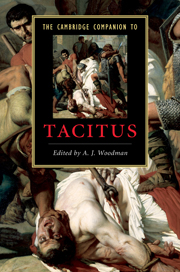Book contents
- Frontmatter
- Introduction
- Part I Contexts
- Part II Texts
- 3 The Agricola
- 4 The Germania as literary text
- 5 The faces of eloquence: the Dialogus de oratoribus
- 6 Fission and fusion: shifting Roman identities in the Histories
- 7 The Tiberian hexad
- 8 Hamlet without the prince? The Claudian Annals
- 9 ‘Is dying so very terrible?’ The Neronian Annals
- Part III Topics
- Part IV Transmission
- Chronological table
- Abbreviations and bibliography
- Index
3 - The Agricola
from Part II - Texts
Published online by Cambridge University Press: 28 March 2010
- Frontmatter
- Introduction
- Part I Contexts
- Part II Texts
- 3 The Agricola
- 4 The Germania as literary text
- 5 The faces of eloquence: the Dialogus de oratoribus
- 6 Fission and fusion: shifting Roman identities in the Histories
- 7 The Tiberian hexad
- 8 Hamlet without the prince? The Claudian Annals
- 9 ‘Is dying so very terrible?’ The Neronian Annals
- Part III Topics
- Part IV Transmission
- Chronological table
- Abbreviations and bibliography
- Index
Summary
The Agricola's first words, echoing the opening of Cato the Elder's Origines (fr. 2P = 2C), are as follows: 'to record for posterity famous men's deeds and characters is an ancient practice not abandoned even in our times' (1.1). There used to be no criticism, even of those who wrote their own Life; 'but now, about to relate a dead man's life, I have needed indulgence, which I should not have sought if planning an invective, so savage and hostile to excellence are the times [infesta uirtutibus tempora]' (1.4). The end of this sentence echoes Cicero's complaint in 46 BC (Orat. 35 tempora . . . inimica uirtuti). Tacitus then recalls how Arulenus Rusticus' Life of Thrasea Paetus, and that of Helvidius Priscus by Herennius Senecio, had resulted in the death penalty for their authors and in their books being burned (2.1). Tacitus did not need to specify that Thrasea and Priscus were senators and Stoics, who had met their deaths for 'opposition'. The fate of Rusticus, Senecio and others, condemned in 93, would be taken up again just before the end of the work (45.1), but for the moment Tacitus continues: 'No doubt they thought that in that fire the voice of the Roman people, the liberty of the senate and the conscience of mankind had been wiped out, since in addition the teachers of philosophy [sapientiae professoribus] had been expelled and all noble accomplishments driven into exile, so that nothing honourable might anywhere confront them' (2.2). Whereas 'the former age [uetus aetas] witnessed an extreme of freedom, we have experienced the depth of servitude' (2.3).
- Type
- Chapter
- Information
- The Cambridge Companion to Tacitus , pp. 47 - 58Publisher: Cambridge University PressPrint publication year: 2010
- 1
- Cited by

